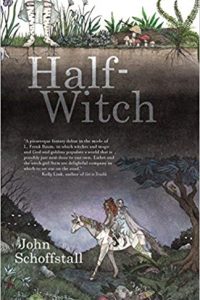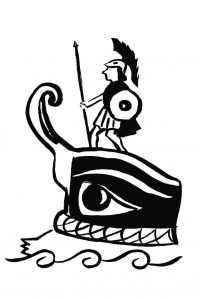journal of the plague week
Schools in my area of the U.S. are shutting down because kids and staff are too ill to work. My oldest was just sent home sick, even though she’s not overly sick, because the nurse is understandably twitchy about keeping everyone contagion free. I wouldn’t say that anyone is hysterical about the whole thing — we Northeasterners are not known for our flights into hysteria because we learned a lesson after the whole Salem witch debacle — but we are keeping a firm eye on the situation.
Which, of course, doesn’t concern you at all, really, unless you live nearby. But it did get me to thinking about great genre books about pandemics. The first that leap to my mind is King’s The Stand. The second was Willis’ gorgeous The Doomsday Book. I couldn’t come up with a third, however. Or, at least, not one that I’d recommend.
So I thought I’d toss it out to you. What are the great genre books about pandemics?




The best of the best is Earth Abides by George R. Stewart. (PS. Get comment box software that allows use of italics; I couldn't italicize the novel's title.)
A couple of terrific short stories spring to mind: Tiptree's "The Last Flight of Doctor Ain" and "The Screwfly Solution"; and Tananarive Due's "Patient Zero".
Saramago's Blindness?
I'm not sure of these but I think of Greg Bear's Blood Music and Darwin's Radio as such.
Blood Music, absolutely. And World War Z.
A while back my wife recommended I read The Time of the Fourth Horseman by Chelsea Quinn Yarbro. She said it made an impression on her when she read it back in the 80s. Can anyone second that recommendation?
The Long Loud Silence by Wilson Tucker. I first read this in the last third of 2001, when anthrax (which figures prominently in the book) was the disease everyone was worried over. Talk about the right book at the right time!
Stephen–I'll second your wife's recommendation of The Time of the Fourth Horseman. It conveys a gritty, overcrowded urban scene that is more mundane than Ridley Scott's Bladerunner but was equally convincing to me. The medical hybris that forms the central plot element is dated (I hope). It seems to me that we're more scared of everything now. But the temptations of power don't change much.
I'd agree with rosefox about World War Z, as well.
Susan Loyal
John Clute in his obituary of Tucker wrote this about "The Long Loud Silence:"
"a tale so bleak in its assumptions about the possibilities of civilisation after a devastating plague that the American versions were censored. Only the British edition printed a text which made it clear that the greyish, mania-ridden protagonist does, in fact, in the end, resort to cannibalism in order to survive."
Later US editions did restore the text. Make sure you get the correct bleak story!
Speaking of bleak (and of plague, actually) Alan DeNiro's Total Oblivion (More or Less) is very good and very good at bringing me down. The surrealness takes the edge off but I might have to read something about happy unicorns soon, lest I give up and take to my bed.
My favorite non-genre plague book is Geraldine Brooks' Year of Wonders. If you haven't read it, I'd urge you to give it a try.
It looks like the BBC is about to update the subject in a new version of a late 80s/early 90s show titled Survivors. If the remake is anything like the original, it should be discussion-worthy.
Susan Loyal
Of course, the granddaddy of all the zombie-plague vampire-plague books would be Richard Matheson's "I Am Legend." I admit I didn't "get" this when I was a kid, but I did when I reread it a few years ago. (I suppose anybody reading here already knows none of the three movies officially based on the book "got it," either.)
More recently, Barth Anderson's Patron Saint of Plagues.
Steven Amsterdam's resent australian winner "Things we didn't see coming" is about pandemics among other things.
By the way in Moscow, Russia the situation is pretty same: only two pupils of twenty attend my son's class and their teacher is ill.